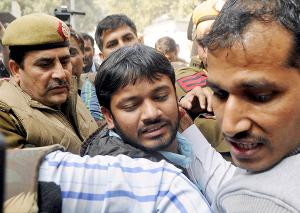New Delhi, Feb 25: The police on Wednesday told the Delhi High Court that Jawaharlal Nehru University (JNU) Students’ Union president Kanhaiya Kumar organised the “anti-national” event on the campus on February 9.
 The police sought Kumar’s custody for interrogation along with two other students Umar Khalid and Anirban Bhattacharya, who were sent to three-days remand by a magistrate. The three have been arrested over charges of sedition.
The police sought Kumar’s custody for interrogation along with two other students Umar Khalid and Anirban Bhattacharya, who were sent to three-days remand by a magistrate. The three have been arrested over charges of sedition.
While Kumar was arrested on February 12, Khalid and Bhattacharya surrendered late on Tuesday night. Khalid and Bhattacharya were questioned for five hours at the South Campus police station on Wednesday.
“Kumar is required to be confronted with the two arrested accused due to new circumstances and evidence,” Additional Solicitor General (ASG) Tushar Mehta told the court. Mehta then requested the court to defer Kumar’s bail petition on which the hearing was posted for February 29.
The 13-page status report filed in pursuance to the court’s direction stated: “Kanhaiya not only participated in the event, but organised it in connivance with other accused...shockingly the incident records the presence of foreign elements with their faces covered. The investigation agency is looking for linkage between the petitioner (Kanhaiya), his co-accused and the said foreign elements.”
The police said they have identified the students who were leading the procession where around 30 “anti-India” slogans were raised. A probe is on to ascertain those behind “non-educational activities and the objective behind it in larger national perspective,” police added.
The CCTV footage provided by the varsity has been analysed and the police are probing as to whether “any person with a possible anti-national background entered or stayed in the campus.” The status report also said the unedited video clip from a TV channel was “not the footage which is being debated as doctored.” “It is totally different and contemporaneously recorded raw unedited video footage. However, video is not the sole evidence,” the report added.
The police said Kumar did not cooperate and opposed his bail on the grounds that if released he may influence witnesses.






Comments
What is going on is shameful.......................video states clearly that no Pro pakistan slogan raised .....secondly each time things like this happens then RSS Goons try to take law into hands................
DONT FORGET IF DALITS STARTS TO REVOLT YOU MANUVADIS HAVE NO PLACE IN INDIA
Add new comment